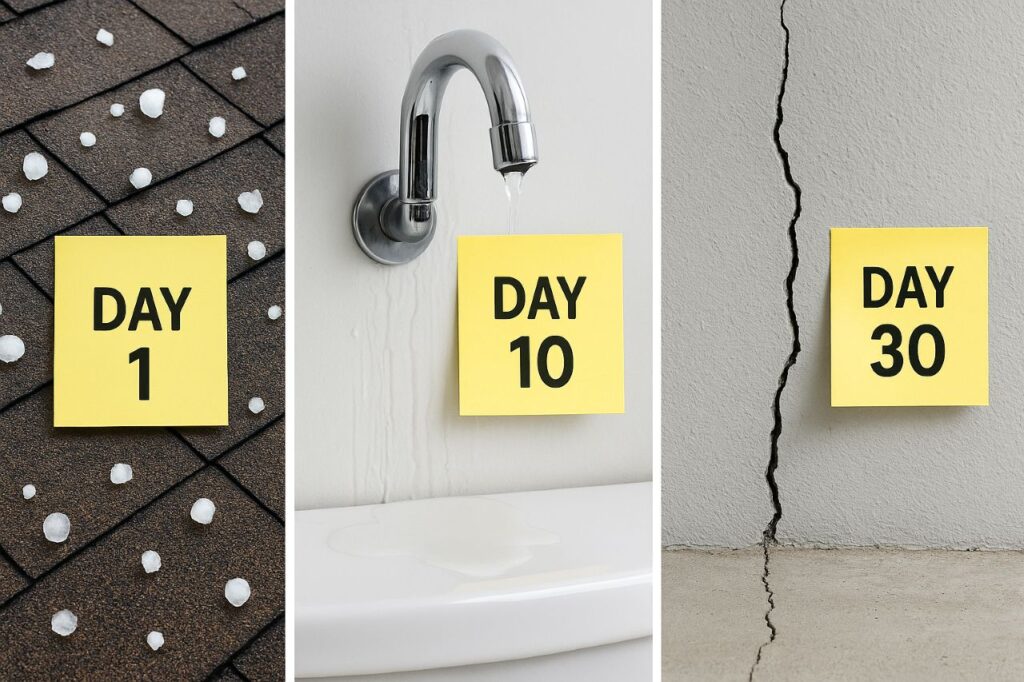Home Insurance Claim Time Limit Texas: Complete Guide
Home insurance claim time limit Texas is a term every homeowner in the Lone Star State should know intimately. Whether it’s recouping damages from an unexpected hailstorm in Dallas or recovering from flooding in Houston, knowing your legal time frame to file a home insurance claim is essential. But countless homeowners forfeit their compensation simply because they didn’t move quickly enough—or had no idea their policy had a tight deadline.
In Home insurance claim time limit Texas, deadlines are not always clear-cut. Although most policies have a standard time limit, certain conditions or damage types can shift the timeline significantly. Delaying too long or filing in the wrong way may cost you thousands of dollars in repairs. In this step-by-step guide, we’ll dissect the specific home insurance claim deadline in Texas, describe what impacts it, and demonstrate how to safeguard your rights using real-life examples and legal documents.
By knowing the facts, your post-damage actions will be certain and timely—ensuring your best chance for a payout and less stress when disaster occurs.
Table of Contents
7 Shocking Facts Exposed – Home insurance Claim Time Limit Texas
1. Knowing the Standard Home Insurance Claim Time Limit Texas

What is the Typical Deadline for Home Insurance Claim Time Limit Texas?
Knowing the home insurance claim time limit Texas policies mandating is important if you ever experience property loss. The majority of Texas homeowners insurance policies offer a claim period of 1 to 2 years from the occurrence date of the damage. That said, this does not indicate you can wait a year to report your insurer. Indeed, nearly all policies include a notice of loss provision mandating you to notify the loss within a reasonable time frame, which may be as brief as 30 days.
State Farm, for instance, dictates within its Texas home policy that notification of damage has to be furnished immediately following loss. Likewise, Allstate dictates that not reporting in a timely manner could have a claim denied. You are able to access sample policy provisions on State Farm’s Texas web page and Allstate’s information on coverage.
Waiting even though it’s technically still within the home insurance claim time limit Texas permits might result in losing your right to indemnification in case the insurer feels your notice was untimely.
Legal Directives from the Texas Department of Insurance (TDI)
Texas boasts some of the most regimented consumer protection insurance laws in the country. The Texas Department of Insurance (TDI) dictates certain rules insurers have to adhere to after a claim has been filed. Based on the TDI official website, after filing your claim:
- The insurer is required to acknowledge receipt within 15 calendar days.
- They are required to start investigating the claim in a timely fashion.
- Within 15 business days of receiving all documents required, your claim will be approved or rejected by the insurer.
Payment for accepted claims should be made within 5 business days. These rules do not, however, extend the period within which you should submit the claim itself.
The Prompt Payment of Claims Act (Texas Insurance Code 542) penalizes insurers for delays—but it also presumes you have made your claim within the proper home insurance claim period Texas law anticipates. If you are late with your filing, these safeguards no longer benefit you.
- Tip: Always file a claim as soon as possible after any property damage occurs—even if you’re still assessing the full extent of the loss.
Factors That Could Shorten the Time Limit- Home Insurance Claim Time Limit Texas
Some Home insurance claim time limit Texas are subject to even tighter timelines, depending on the nature of the damage and how long it took to discover:
- Water Damage:
- Many Texas policies limit water-related claims to a 14–30 day notification window.
- Late discovery of leaks may be denied if insurers believe “neglect” occurred.
- Hail & Windstorm Damage:
- Some providers limit hailstorm or wind damage claims to 180 days from the event.
- Cities like Lubbock and Dallas frequently experience hail, making this limit especially relevant.
- Foundation or Structural Damage:
- Because these issues may develop over time, you may need to prove when the damage occurred.
- If you don’t report right away, insurance companies will likely claim the loss occurred before coverage.
These closer windows are within the wider Texas home insurance time limit for contracts but can set aside the normal 1–2 year interval if detailed within your policy.
Discover more details about specific claim time-frames from reading legal abridgments for Nolo’s Insurance Claim Guide.
Real-Life Example: Denied for Late Reporting- Home Insurance Claim Time Limit Texas
In a 2022 Austin case, a homeowner filed a claim for roof damage 11 months after a severe hailstorm. While still within the insurer’s technically eligible 1-year deadline, the claim was rejected on grounds that the homeowner did not alert the company “promptly”, as per the policy. The insurer claimed that the delay enabled further deterioration and damage assessment became impossible.
The court ruled in favor of the insurer, affirming again that submission within the Texas home insurance claim time limit set by policies is not sufficient—you need to act fast as well.
Last Word for Homeowners:
If you are a Texas property owner, your best protection is timely action. Understand your policy, document all, and submit early—even when still awaiting estimates or contractor reports.
For more information about your rights and obligations, go to the Texas Department of Insurance Claim Help Center, which provides free resources, timelines, and downloadable complaint forms if your claim is denied or delayed.
2. Key Factors That Can Impact Your Home Insurance Claim Time Limit Texas

The home insurance claim time limit Texas policies specify isn’t always as simple as a specific number of days or months. There are a number of important factors—from damage type to policy terms—whose presence can either reduce or add time to your actual deadline. Understanding what affects your timeline prevents you from losing the compensation you’re entitled to.
Policy-Specific Conditions You Need to Know
Each house insurance policy in Texas is unique. Even from top companies such as Farmers, Liberty Mutual, and USAA, conditions and terms are different—particularly when it comes to reporting periods and documentation requirements.
Typical time-conditional provisions are:
- Notice period of loss (e.g., report within 30 days).
- Submission of proof of loss within a designated time frame.
- Mitigation requirement, or prevention of further damage after the occurrence.
Check your declarations page or get a copy of your full policy from your insurance company. You can also see sample policies in TDI’s sample policy database to see how these provisions usually read.
Regardless of whether home insurance claim time limit Texas has is 1 year, there can be internal provisions that bring it down to as little as 30 days for some types of damages.
Type of Damage: Not All Losses Are Equal
The nature of damage has a great deal to do with how rapidly you need to respond. Insurers will tend to split accidents and sudden happenings from creeping or insidious damage.
- Rapid-report Required:
- Windstorm and hail damage (the norm in Dallas/Fort Worth).
- Plumbing failures or burst pipes.
- Fire or explosion.
Most policies will allow you a 90–180 day grace period for reporting these kinds of losses—wait too long, and it will be denied.
- Increased scrutiny or shorter limits:
- Leaks or seepage of water, roof leaks.
- Mold or termite damage.
- Soil movement and cracked foundations.
These types of damage have a requirement of evidence for timely discovery, so there is a need to move as soon as symptoms manifest. Even if it is a small issue, document the problem with photographs and obtain an inspector’s input immediately.
The home insurance claim time limit Texas honors does not assure approval if the insurer deems you didn’t notice or report the problem on time.
Delayed Discovery vs. Immediate Damage
Not all property damage is immediately obvious. In cases where damage develops slowly—like a roof leak from an old storm or plumbing corrosion—Texas law allows for reasonable discovery delays, but this is still a grey area.
For instance, in a 2021 appeal case, a slab foundation damage claim was rejected because the homeowner took more than a year after observing small cracks. The court held that the claim did not satisfy timely notice conditions, although it was within Texas policy home insurance claim duration.
To prevent this, always:
- Record when you first observed the problem.
- Maintain inspection reports and contractor emails.
- Send written notification to your insurer—even if you’re not filing the complete claim yet.
Documents and Delays:
Delays in sending mandatory documents can affect your timeline too. Insurers usually ask for:
- Proof of loss form.
- Photographs and footage of damage.
- Receipts for emergency work or temporary accommodation.
- Inspection reports or estimates from contractors.
Not sending these on time can stall or even cancel your claim, especially if your provider feels that you’re not cooperating.
Learn more about filing procedures and forms on the National Association of Insurance Commissioners (NAIC) website.
Government Declarations and Emergency Extensions
Although it does not happen often, the state of Texas can declare a disaster emergency, which may temporarily change the deadlines. For instance, following Hurricane Harvey in 2017, some insurers granted deadline extensions for homeowners who had been affected to file claims and submit documentation.
They are not automatic. You will:
- Confirm if your policy is covered under emergency proclamations.
- Obtain written assurance from your insurer regarding any extension.
- Still provide notice as soon as possible to secure your rights.
Current disaster declarations can be found at Texas Disaster Portal.
Last Word on Claim Timelines
The home insurance claim time limit Texas allows could be stated in your agreement—but your actual deadline may be a lot shorter depending on what resulted in the damage and how your policy is written. To prevent expensive delays:
- Understand the timing in your contract.
- Maintain detailed records.
- File notice of loss even before you comprehend the damage.
Being quick and being careful provides you with the most opportunity to obtain the payout that you require without legal battles or denials.
3. What if You Miss the home insurance claim time limit Texas?

Missing the home insurance claim time limit Texas can have serious implications—even if your damage is genuine and your policy covers it. Unlike small policy errors that may be overlooked, late reporting is one of the quickest ways to lose your claim to reimbursement in its entirety.
Claim Denial: Most Likely Scenario
When you make a home insurance claim beyond the permitted deadline, the insurer has every right by law to reject it. The insurers usually write strict “suit limitation” clauses in the policy, which not only restrict when you can make a claim, but also when you can make a lawsuit against a rejected claim.
As an example, if your policy specifies that you have to sue within two years of the loss date, and you wait too long even though negotiations or appraisals are ongoing, you might lose standing in court altogether.
Texas courts usually stick to these conditions very strictly, particularly if the homeowner was slow in notifying them or did not provide proper papers. As per a legal analysis by NOLO, failure to meet deadlines ranks as one of the top three reasons for the denial of home insurance claims nationally.
Legal Remedies Are Very Minimal
If your home insurance claim time limit Texas policy has passed and your claim is rejected, there are practically no legal solutions to turn to:
Most courts won’t overrule:
- Missing policy timelines.
- Not issuing notice in writing.
- Inadequate documentation or proof of timely discovery.
You may still have hope if:
- The insurer acted in bad faith (e.g., didn’t respond, misled you).
- You can establish unavoidable delay due to health crises or disasters.
- There’s written proof that the insurer extended your deadline.
For legal counsel under such circumstances, you can approach the Texas Department of Insurance Consumer Help Division or seek the assistance of a property insurance attorney with a license.
Actual Case: Lawsuit Dismissed on Account of Filing Late
In Bennett v. State Farm Lloyds (2018), a Texas homeowner sued for uncompensated roof repairs after two years had passed. Although damage took place due to a windstorm, the court ruled in favor of the insurer, finding the claim and lawsuit were filed too late, even though the policyholder attempted to justify the delay.
This situation emphasizes that even if your damage is legitimate and provable, neglecting the home insurance claim deadline Texas providers specify in writing can invalidate your claim and your legal rights.
Best Practices to Avoid Missing Deadlines
To avoid these effects, use these action steps:
- Report immediately any suspected damage to your insurer.
- Provide written notice by email, certified mail, or online claim portal.
- Request your insurer to acknowledge deadlines in writing.
- Maintain a claim schedule with notice dates, inspection, repair, and correspondence.
You can also ask advice from your agent or go to TDI’s Homeowners Insurance Claims Guide for a checklist of steps.
4. Step-by-Step Process to Making a Timely Home Insurance Claim Time Limit Texas

Time is your greatest resource if you’ve suffered property damage. Making a home insurance claim time limit Texas is not complicated—but making it on time and the right way is what sets the difference. To remain in the home insurance claim time limit Texas mandates and elude delays or refusals, utilize this tested step-by-step process.
- Step 1: Document the Damage Immediately
- Take clear, timestamped photos of every damaged area.
- Record videos to show movement (e.g., water flow, leaks).
- Keep receipts or invoices for any emergency work done (e.g., roof tarp, water extraction).
You’ll need this evidence to support your claim, especially if the timeline is questioned later.
Tip: Even before filing, this evidence proves when the loss was discovered—key for staying within the home insurance claim time limit Texas policies enforce.
- Step 2: Inform Your Insurance Company Immediately
- Reach out to your insurer’s claims department between 24 and 72 hours after you’ve found damage.
- Access their online portal, mobile app, or toll-free line.
- Ask for written confirmation of the filing of your claim and case number.
Numerous companies let you start the process online. For instance, USAA and Farmers Insurance have quick-start claim forms on their websites.
- Step 3: Provide All Documents Needed
- Every insurance company can have special demands, but usually, you will be required to provide:
- Signed and filled proof of loss form
- List of damaged items in detail
- Photos, videos, receipts
- Estimated cost provided by a licensed contractor (if already done)
Not providing these in time can lead to delays that might leave you beyond the home insurance claim period Texas businesses require.
- Step 4: Let the Adjuster Inspection
- Once you submit, an insurance adjuster will come to your property to:
- Verify the degree of the damage.
- Compare physical findings and evidence that you have.
- Forward their report for the insurer to determine a payout.
- Ensure someone is present to guide them through everything. Be truthful, thorough, and hand over all of the evidence you’ve gathered.
If you’re not satisfied with the report from the adjuster, hire a licensed public adjuster to review your damage independently.
- Step 5: Follow Up and Monitor Progress
- Insurance providers have to adhere to TDI rules following your report of a claim. Under Texas Insurance Code §542:
- They should respond with an acknowledgment within 15 calendar days.
- 15 business days are given to them from the time they receive your papers in order to accept or reject the claim.
- Payment should be made within 5 business days following approval.
Still, don’t assume everything is handled—follow up regularly via phone or email. If delays occur, you’ll want a record of your communication history.
Stay Within the Legal Time-frame – Home Insurance Claim Time Limit Texas
Even if your case is complex, make sure all major claim steps are initiated within the home insurance claim time limit Texas law and policy terms require. That means:
- Initial report within days of discovery.
- Documentation submitted within weeks.
- Legal or lawsuit action (if not accepted) within 1–2 years from the loss date (review your policy).
For further information, check out the Texas Department of Insurance: Filing a Homeowners Claim page.
5. Most Common Mistakes That Result in Missed Deadlines

Well-prepared homeowners may also lose their claim if they commit tiny yet expensive mistakes. The home insurance claim deadline Texas policies mandate is not always lenient—minor slips can cause missed deadlines, rejected claims, or lower payouts. Below are the most frequent mistakes and how to avoid them.
- Waiting Too Long to Report the Damage:
- One of the largest traps is thinking that since your policy provides up to one or two years to file, you can wait until the damage is severe. In fact, most policies have immediate notice requirements, and insurance companies might consider “prompt” to be within days.
Example: A homeowner in Houston waited three months for a small leak on their roof, believing it wasn’t a major problem. When they finally submitted the claim, it was rejected because of “delayed reporting” though the timeline technically qualified as within the home insurance claim deadline Texas policies permit.
- Assuming the Damage Will Be Covered Later: Some homeowners wait too long to file because they are going to “wait and see” if there needs to be a repair. This wait-and-see tactic is hazardous because:
- Evidence can disappear.
- More damage can be attributed to neglect.
- You can miss your reporting period.
Always report a potential claim right away—you can cancel it later if it’s a minor issue.
- Not Reading or Understanding Policy Terms: Your policy could have provisions such as:
- Proof of loss within 60 days.
- Time limit to sue (usually 1 year).
- Different deadlines for hurricane, wind, or flood claims.
If you’re not sure about these definitions, you might miss important deadlines and forfeit protection under the home insurance claim time limit Texas requires you to adhere to.
Utilize resources such as the National Association of Insurance Commissioners (NAIC) to have a better grasp of policy jargon and specifications.
- Missing or Incomplete Documentation: Most claims get delayed or rejected because homeowners don’t:
- Take sufficient photographs.
- Submit receipts or itemized lists of loss.
- Give true repair estimates.
Your insurance company can’t process a claim without evidence—and if too much time has elapsed, they’ll close your file for “lack of evidence,” even within the usual home insurance claim time limit Texas policies offer.
- Over-reliance on Oral Agreements:
- Never depend only on a call with your insurance agent or adjuster. Always obtain significant statements by writing or email. If a deadline is verbally extended but not put in writing, your claim can still be denied.
Document everything: when you called, what was stated, and whom you talked to.
How to Avoid These Mistakes – Home Insurance Claim Time Limit Texas
- Create calendar reminders the instant damage is found.
- Report the loss, even if it’s minor.
- Read your entire policy or speak with your agent.
- Send everything in writing and keep a record of your communications.
- Save your claim file (photos, forms, reports) in one electronic folder.
Go to the TDI Claims Center for checklists and filing tips.
Conclusion: Protect Your Home by Respecting the Clock – Home Insurance Claim Time Limit Texas

Missing the Home insurance claim time limit Texas imposes in your policy is not just a bureaucratic technicality—it’s a financial catastrophe waiting to occur. Whether your roof is leaking due to hail damage or your kitchen flooded from a ruptured pipe, timing is critical when making a claim in Texas.
From knowing the deadlines of the law, through when to file, through avoiding routine pitfalls such as late notice or inadequate documentation—taking action ahead of time saves you dollars and headaches. Texas law anticipates homeowners to move quickly, document accurately, and abide by their policy provisions carefully.
Action step: Read your policy now. Highlight important dates. Set reminders. And the next time damage occurs—file early, follow up, and avoid jeopardizing your claim entirely.
For additional assistance, go to the Texas Department of Insurance Claims Portal or talk with your agent to determine your unique Home insurance claim time limit Texas circumstances.
Want to boost your insurance sales strategy? Check out our guide on How to Sell Home Insurance: 5 Secret Tricks Top Agents Use to learn proven methods used by industry leaders.
Frequently Asked Questions (FAQs)- Home Insurance Claim Time Limit Texas
What is the typical home insurance claim time limit Texas?
Most policies allow you to file a claim within 1 to 2 years, but many require notification within 30 days or less. Always check your specific policy for exact deadlines.
What happens if I file after the deadline?
Filing after the home insurance claim time limit Texas permits often results in an automatic claim denial. You may also lose the right to sue if you miss legal filing windows.
Can I get an extension on my claim deadline?
Some insurers may offer an extension during natural disasters or on a case-by-case basis, but you must request this in writing and get confirmation. Always file promptly to avoid needing one.
What documents do I need to submit with my Home insurance claim time limit Texas?
Typical documentation includes for Home insurance claim time limit Texas:
1. Photos or videos of the damage
2. Proof of loss form
3. Receipts or estimates
4. Inspection reports if applicable
Can I still file a claim if I discovered the damage late?
Yes, but you’ll need to prove that you reported it as soon as reasonably possible. “Delayed discovery” claims are common with roof leaks and foundation issues but are closely scrutinized.







